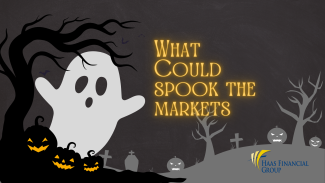
What Could Spook the Markets
The stock market has been on quite a run, up roughly 35% since April, and sitting near record highs. That kind of performance tends to make investors feel pretty good… until they start to wonder, “What’s going to go wrong?” As Halloween approaches, LPL Research shared a timely look at what might “spook” markets in the months ahead. While some risks sound unsettling, it’s important to remember that markets are always juggling both fear and opportunity. Here’s a breakdown of what’s keeping economists up at night and how we can keep our emotions in check through it all.
- A Slowing Economy - The U.S. labor market (a major driver of economic growth) is losing some steam. Job growth is slowing, and if it continues, it could eventually lead to less consumer spending and softer overall growth. That’s the natural rhythm of a late-cycle economy. The Federal Reserve knows this and is preparing rate cuts to help cushion the slowdown. For investors, it’s not about predicting the next recession; it’s about having a plan that already assumes market will experience ups and downs along the way.
- High Stock Valuations - After a strong run, stock prices are high, especially in the technology and AI sectors. The S&P 500 now trades near 28 times earnings, close to levels last seen during the late-1990s dot-com boom. That doesn’t mean the bubble is about to burst, but it does suggest that future returns could be more modest. Historically, higher valuations tend to lead to lower long-term returns. It’s a good reminder that investing is about time in the market, not timing the market. Chasing what’s hot rarely leads to lasting success, but staying invested through different cycles often does.
- Rising Leverage and Investor Risk-Taking - Margin debt, money investors borrow to buy more stocks, has climbed more than 30% since spring. Leverage can amplify gains, but it also amplifies losses. Periods of heavy borrowing often precede higher volatility. When markets wobble, those who took on too much risk are often forced to sell, which can worsen the pullback. This is why we believe in balance; not getting swept up in market euphoria, but also not letting fear drive us completely to the sidelines.
- The Fed’s Balancing Act - Markets are expecting the Federal Reserve to cut interest rates five more times by the end of next year. That could help borrowers and support growth but there’s a fine line. If the Fed cuts too aggressively while inflation remains sticky, it could risk losing credibility on price stability. If they don’t cut enough, bond investors could face painful repricing as yields rise. Either way, this uncertainty reinforces the value of diversified planning. No one can perfectly predict what the Fed will do next, but we can design portfolios that don’t rely on guessing right.
- The “Spooky” Signals from the Bond Market - Bond yields have been drifting lower since May, often a sign that investors expect slower growth ahead. Lower yields can be positive for stocks in the short term, but if they fall too far, it may start signaling deeper economic concerns. The key takeaway: the bond market is flashing “caution,” not “panic.” Pullbacks happen, but historically, they’ve created opportunity for patient investors.
Putting it all together, yes, there’s a lot that could spook markets right now; slower growth, high stock prices, rising leverage, Fed uncertainty. But here’s what’s equally true: inflation is cooling, the Fed is cutting rates, AI-driven investment is fueling corporate profits, and fiscal spending is supporting economic activity. History tells us that bull markets don’t end just because people get nervous. LPL’s team remains “neutral on stocks overall” but sees any pullback as “likely to be shallow and buyable.” At Haas Financial Group, we agree that market scares come and go, but financial planning is about more than reacting to the news. It’s about knowing what you own, why you own it, and how it all ties back to your life goals and what really matters most to you in life.
So, as the headlines turn spooky this season, remember - fear may move markets in the short term, but discipline and planning move lives forward in the long run.
Source:
Investment Advice offered through Great Valley Advisor Group, a Registered Investment Advisor. Great Valley Advisor Group and Haas Financial Investment Advice offered through Great Valley Advisor Group, a Registered Investment Advisor. Great Valley Advisor Group and Haas Financial Group are separate entities. This is not intended to be used as tax or legal advice. Please consult a tax or legal professional for specific information and advice. are separate entities. This is not intended to be used as tax or legal advice. Please consult a tax or legal professional for specific information and advice.
Ticket #T010026

